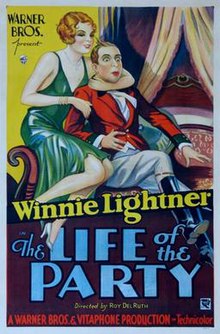Plot
Flo and Dot work in a Broadway music shop. Flo sings while Dot plays the piano. Their boss complains to them that they are not selling as much sheet music as they should, and asks them to change their technique. Flo sings a song for a customer, after which, one of Dot's admirers, Monsieur LeMaire (Charles Judels), an eccentric Frenchman who owns a modiste shop, enters the shop. He begins annoying the boss by chatting with Dot and asking her out. When the boss tells him to come back after they finish working, LeMaire flies into a rage and throws sheet music all over the store. The boss immediately fires Dot and Flo. The scene moves to the apartment where the two women live. Dot is reading the newspaper and finds out her boyfriend has eloped with a rich elderly widow. She is so angry that she accepts Flo's idea that they become gold-diggers. Flo suggests that their first victim be LeMaire and the next day they begin to work for him. LeMaire soon asks Dot and Flo to a private party. Flo tells him they would love to attend but they have no suitable clothes. LeMaire tells them that they can borrow clothes from his modiste shop. Dot and Flo agree to attend the party and then pack off all the clothes they can carry with them. They head off to the train station with their luggage of expensive clothes and decide to go to Havana to make some real money.
Once Flo and Dot arrive in Havana they find that a millionaire, "A.J. Smith", who invented a famous soft drink, is staying at the hotel. They assume that a mean spirited and snobby acting man is the millionaire but the true millionaire is a young, pleasant and down-to-earth man. Dot falls in love with Smith, much to Flo's chagrin. Smith, unbeknownst to Flo and Dot, is actually a gigolo looking for a rich woman to pay his meal ticket. Just as Dot is to marry the gigolo, LeMaire arrives and exposes the two gold-diggers. Smith, who has fallen in love with Dot, writes a check to LeMaire to cover the amount he lost, and he ends up winning Dot as his future wife.
A subplot involves Flo and Colonel Joy (Charles Butterworth), who raises horses. Colonel Joy is attracted to Flo and can't stop talking to her, although she does her best to avoid him. After some time, Flo is convinced by the colonel that his horse can't lose in the upcoming horse-race. She takes a chance and bets all her money, only to lose everything. Eventually they grow fond of each other and Colonel Joy proposes to Flo at the end of the film.
This page is based on this
Wikipedia article Text is available under the
CC BY-SA 4.0 license; additional terms may apply.
Images, videos and audio are available under their respective licenses.

